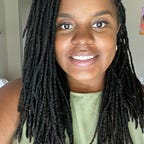Building With, Not For
How Onward is building a movement grounded in proximity, co-creation, and community-centered design
From the outside, it looks like Thaly Germain is always on the move — building, founding, organizing, and creating. But she is also, always, trying to stay grounded. After living through a coup d’etat in Haiti, then moving to the U.S. and living through the Crown Heights riots, Thaly understands the importance of taking space for healing, listening, and grounding, even when the world is moving at a clip.
At the first pop-up meeting for Onward, Thaly and her team looked around and watched young Black and Brown people being who they were — feeling free, without being called into question. They wore du-rags, cornrows, smiles. They talked how they might talk at home, freely. There is power in this type of gathering, Thaly notes, where young people, Black people, long-silenced people have the freedom to be their full selves as they co-create the future they know they deserve.
If one thing about the future of learning can be made clear by Onward’s work, it’s that proximity, listening, and partnership are key to building responsive spaces. So many institutions are led by people who are not actually seeing or listening to the communities they serve. Onward has been intentional about maintaining that proximity and building responsively. Their research and development lab tests and pilots these responsive, innovative ideas. In their R&D lab, Onward has designed a set of equity design cards and a board game to teach about redlining and inequitable housing practices. The equity design cards work both to help players learn the experience of varying levels of privilege as well as leave with action steps they can take given their experience. The redlining board game helps illuminate the ways that lack of access has been systematized in how cities are built. They are prototyping both of these experiences in different spaces, including a set of pop-up museums across the country, and listening as communities give feedback.
In addition to these prototypes they are testing and piloting, Onward is taking time to listen and respond to communities across the country and world. They responded to their community’s emotional needs during the pandemic by hosting free healing sessions online. They completed a musical piece with a visual aesthetic around gentrification. They worked with the local Indigenous community on an exhibit showing the way that space has been taken from the Indigenous people of New York. In this spirit of learning, the team also spent time learning in Palestine and Israel. There, they met with local authors and community members, in refugee camps and experiencing security stops. They spent similar time in Chicago, learning place-specific needs and developing solutions alongside local designers, artists, and activists. Thaly describes these learning visits are as spaces for the Onward team to learn, to support where they can, and to design transformative solutions with communities. They believe in practicing what they preach, and actively work to do all of this listening and learning with a critical, anti-racist lens.
This listening and building is not just happening at work. Thaly’s own daughter, Taïs, is currently a student of LiberatED, a program that Thaly has formed as an offshoot of Onward. LiberatED’s Homeschooling for Justice curriculum is grounded in identity development for learners from ages 2–8, and is built on the belief that young people need to have a fundamentally different experience at school than they typically do. Thaly’s daughter Taïs cries every Saturday because she wants to go to school. She’s learning about “love cues” — how to love her body by learning about melanin, painting the color of her skin, practicing Capoeira, and learning body positivity.
“I got a cut,” Taïs, who is 3 years old, told Thaly one morning. “My antibodies are working hard to fix it.”
The Homeschooling for Justice pilot allows caregivers to adjust, co-create, and give feedback to shape the direction of the curriculum. The program states explicitly that “caregivers may or may not have a background in education and child development, but they are all experts on their own children and have a wealth of talents that support the development of their children.” There is a spirit of building with and alongside in all that the Onward team embodies, never building for.
This work is not just close to home for Thaly, it is home. Her own child is coming into her full self because of the way Thaly and her team are dedicated to listening to the communities they work with and building alongside them. As fellow educators think about our stake in the future of learning, we must learn from organizations like Onward about the importance of slowing down, listening, grounding, and responding to the needs of those whose futures are most at stake.
